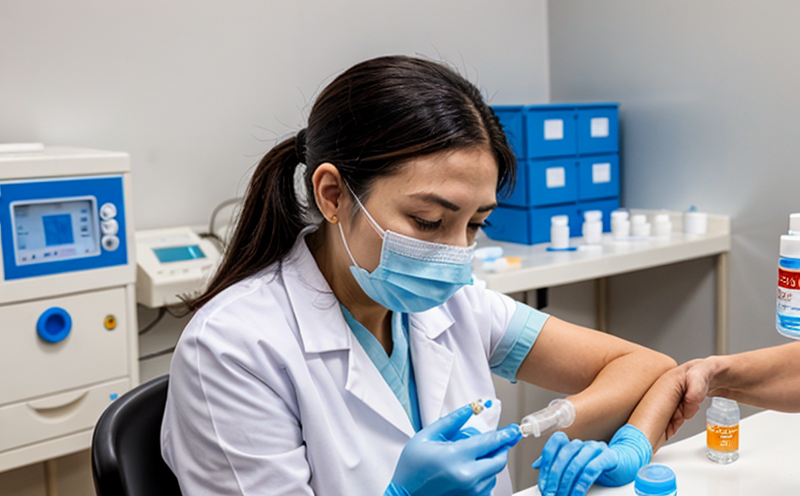Sterility Method Suitability Testing for Vaccines
Sterility method suitability testing is a critical aspect of vaccine development and quality assurance. This procedure ensures that any sterilization or filtration method employed in the manufacturing process does not compromise the sterility of the final product, thereby safeguarding public health.
The primary goal of this test is to verify whether a chosen sterilization or filtration technique can effectively remove viable microorganisms from the vaccine formulation without affecting its integrity. This involves selecting an appropriate challenge organism that simulates real-world contaminants and conducting tests under controlled conditions to assess method efficacy.
In the pharmaceutical sector, especially in vaccine development, sterility is paramount due to the nature of these products being administered directly into the bloodstream or other sensitive areas. Any contamination could lead to severe adverse reactions, making this testing absolutely essential. The test typically follows established guidelines such as USP , EU GMP, and WHO guidelines.
For a method to be considered suitable for use in vaccine production, it must demonstrate consistent performance over time. This includes reproducibility, accuracy, and precision across various batches and different manufacturing sites. The challenge organism used is usually a common pathogen like Pseudomonas aeruginosa or Escherichia coli.
The process begins with the selection of an appropriate method for sterilization or filtration. Common methods include autoclaving, irradiation, and filtration through various types of membranes. Once selected, these methods are tested using a series of steps:
- Preparation of challenge organisms in suitable media.
- Introduction of the organism into the test sample (vaccine).
- Application of the chosen sterilization or filtration method to the sample.
- Culture and incubation of the treated samples under conditions conducive to microbial growth.
The results are then compared against a control group that has not undergone any treatment. If the treated sample shows no viable microorganisms, the method is deemed suitable for use in the vaccine manufacturing process.
It's important to note that this testing is not just about ensuring sterility but also about maintaining the quality and potency of the vaccine. Any changes or modifications to the sterilization or filtration methods must be revalidated according to current good manufacturing practices (cGMP).
The role of Eurolab in providing these services is crucial. Our team of experts ensures that all tests are conducted rigorously, adhering strictly to international standards and guidelines. This consistency and reliability make our results highly respected within the industry.
Eurolab Advantages
At Eurolab, we pride ourselves on delivering comprehensive and reliable sterility method suitability testing services for vaccines. Our expertise lies in providing quality assurance that meets not only local but also international regulatory requirements.
- International Recognition: Eurolab’s certifications are recognized worldwide, ensuring that our clients can trust the results across borders and multiple jurisdictions.
- State-of-the-Art Facilities: We utilize cutting-edge technology and equipment to ensure accurate and precise testing outcomes.
- Experienced Professionals: Our team comprises highly skilled scientists with deep knowledge in pharmaceutical quality assurance, ensuring that every test is conducted meticulously.
- Comprehensive Reporting: We provide detailed reports that not only summarize the results but also offer insights into potential improvements and areas of concern.
International Acceptance and Recognition
The sterility method suitability testing for vaccines is a globally recognized process with strict guidelines. This ensures that the results are accepted by regulatory bodies in various countries, including:
- United States: USP outlines specific requirements and procedures.
- European Union: EU GMP mandates sterility testing as part of vaccine manufacturing.
- World Health Organization (WHO): WHO guidelines emphasize the importance of this test in ensuring vaccine safety.
The acceptance of these tests is crucial for pharmaceutical companies seeking to export their vaccines internationally. Compliance with international standards not only facilitates market entry but also enhances a company’s reputation and credibility.
Competitive Advantage and Market Impact
Conducting thorough sterility method suitability testing can provide significant competitive advantages for pharmaceutical companies:
- Enhanced Product Safety: By ensuring that the sterilization or filtration methods do not introduce contaminants, companies can significantly reduce the risk of adverse reactions.
- Regulatory Compliance: Adhering to international standards helps pharmaceutical companies avoid legal issues and sanctions.
- Increased Market Trust: Demonstrating a commitment to quality and safety through rigorous testing enhances consumer confidence, leading to increased market share.
The market impact of this service is profound. Companies that invest in such testing not only meet regulatory requirements but also differentiate themselves from competitors by offering safer and more reliable products. This can lead to higher sales volumes and stronger brand loyalty.





